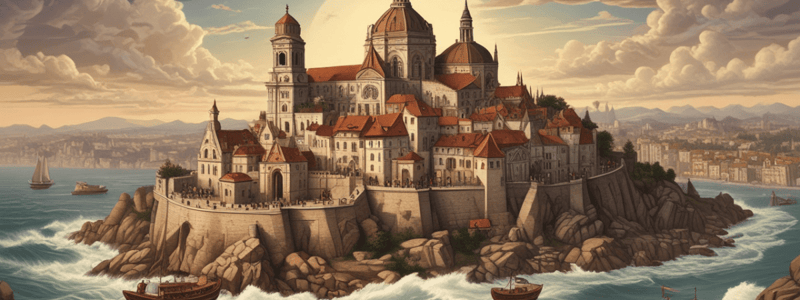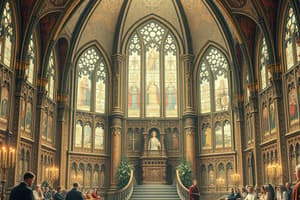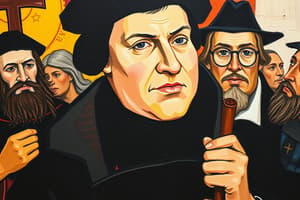Podcast
Questions and Answers
What led King Henry VIII to create his own branch of Protestantism?
What led King Henry VIII to create his own branch of Protestantism?
- The Pope's opposition to his reign as King of England
- The Pope's refusal to grant him a divorce from his first wife, Catherine of Aragon (correct)
- The Pope's insistence on establishing the Inquisition in England
- The Pope's refusal to grant him more power in the Church
What was a social change that resulted from the Reformation?
What was a social change that resulted from the Reformation?
- The decline of the importance of family
- The reduction of women's rights in society
- The increased emphasis on literacy (correct)
- The establishment of the Catholic Church as the sole authority
What was an intellectual change that occurred during the Reformation?
What was an intellectual change that occurred during the Reformation?
- The reduction of intellectual freedom in universities
- The banning of higher education in Protestant countries
- The decline of education for children
- The growth of education for children (correct)
What was a political reform that resulted from the Protestant Reformation?
What was a political reform that resulted from the Protestant Reformation?
What was a significant consequence of the Thirty Years' War?
What was a significant consequence of the Thirty Years' War?
What was a result of the Protestant Reformation in terms of women's rights?
What was a result of the Protestant Reformation in terms of women's rights?
What was a central tenet of Protestant education?
What was a central tenet of Protestant education?
What was a consequence of the French Wars of Religion?
What was a consequence of the French Wars of Religion?
What was a limitation of the Protestant Reformation in terms of political power?
What was a limitation of the Protestant Reformation in terms of political power?
What was the outcome of the German Peasants' War?
What was the outcome of the German Peasants' War?
Flashcards are hidden until you start studying
Study Notes
The Protestant Reformation
- The Protestant Reformation was a significant event in European history and the Christian religion, restructuring the Catholic Church and leading to the creation of new Christian sects.
- By the 16th century, almost everyone in Western Europe was a member of the Catholic Church, making it the most powerful political, cultural, and social authority on the continent.
Reasons for the Reformation
- The Catholic Church's sale of indulgences (forgiveness of sins) was seen as unchristian and hypocritical.
- Many people believed that the ultimate religious authority lay in the text of the Bible rather than in the pope's person.
- Secular rulers were frustrated by the political authority of the pope.
- The Church had amassed vast wealth, and its elite in Rome was more interested in accumulating wealth and status than in the spiritual life of the masses.
Church Corruption
- The Church charged ordinary people a tithe (religious tax) that they had no choice but to pay.
- The Church was a patron of Renaissance artists and architects during the 15th and 16th centuries, with money spent on works of art and the construction of grand buildings largely accrued from religious tithes.
Secular Challenges to Papal Authority
- Secular leaders had often challenged the political powers of the pope.
- King Philip IV of France forced the pope to move the headquarters of the Catholic Church to the French city of Avignon.
The Reformation
- The Reformation began in 1517 when Martin Luther published his Ninety-Five Theses.
- The Reformation continued through the Thirty Years' War, which began in 1618 and ended with the Peace of Westphalia in 1648.
Martin Luther and the Protestant Reformation
- Martin Luther was a German priest and theologian who wrote a lengthy protest against what he saw as errors in the Catholic Church's theology and its secular abuses.
- Luther's document, known as the Ninety-Five Theses, was spread rapidly throughout Europe due to the invention of the printing press.
- Luther refused to recant and was subsequently excommunicated from the Church.
Other Reformers
- John Calvin, a French theologian, was another prominent reformer who changed the face of Christianity.
- Calvin's theology differed from Luther's, with the concept of predestination (God predetermined who would and would not go to Heaven) being a crucial element.
- Calvin's most important book was Institutes of the Christian Religion, published in 1536.
Impact of the Protestant Reformation
- The significant impact of the Protestant Reformation is that England, Scotland, and the Scandinavian countries left the Catholic Church.
- The situation in the Holy Roman Empire was more complicated, with decades of war leading to the Peace of Westphalia in 1648.
- French Protestants (Huguenots) were bitterly persecuted, but were finally granted toleration by the Edict of Nantes in 1598.
Social Changes
- The Reformation led to an increased emphasis on literacy, with Protestant denominations wanting people to be able to read the Bible for themselves.
- Women's rights grew as a result of the Reformation, with some countries granting them the right to divorce and remarry.
- The family became the center of social life in Protestant countries.
Intellectual and Education-Related Changes
- The growth of education for children was a significant intellectual change during the Reformation.
- Universities in Protestant countries found new types of intellectual freedom, as the Catholic Church no longer controlled them.
Political Reforms
- The Protestant Reformation led to numerous political reforms, including:
- Increased authority of local princes in the Holy Roman Empire
- Decreased power of the Holy Roman Emperor
- Increased religious tolerance in the Holy Roman Empire
- Formation of the Netherlands as an independent nation
- The Counter-Reformation by the Catholic Church
Warfare and the Wars of Religion
- The French Wars of Religion (1562-1598) and the Thirty Years' War (1618-1648) were the two bloodiest armed conflicts that resulted from the Protestant Reformation.
- The French Wars of Religion was a prolonged conflict between Catholics and Huguenots, with up to four million casualties.
- The Thirty Years' War was an international conflict mainly fought in the Holy Roman Empire, with up to fourteen million casualties.
Studying That Suits You
Use AI to generate personalized quizzes and flashcards to suit your learning preferences.




